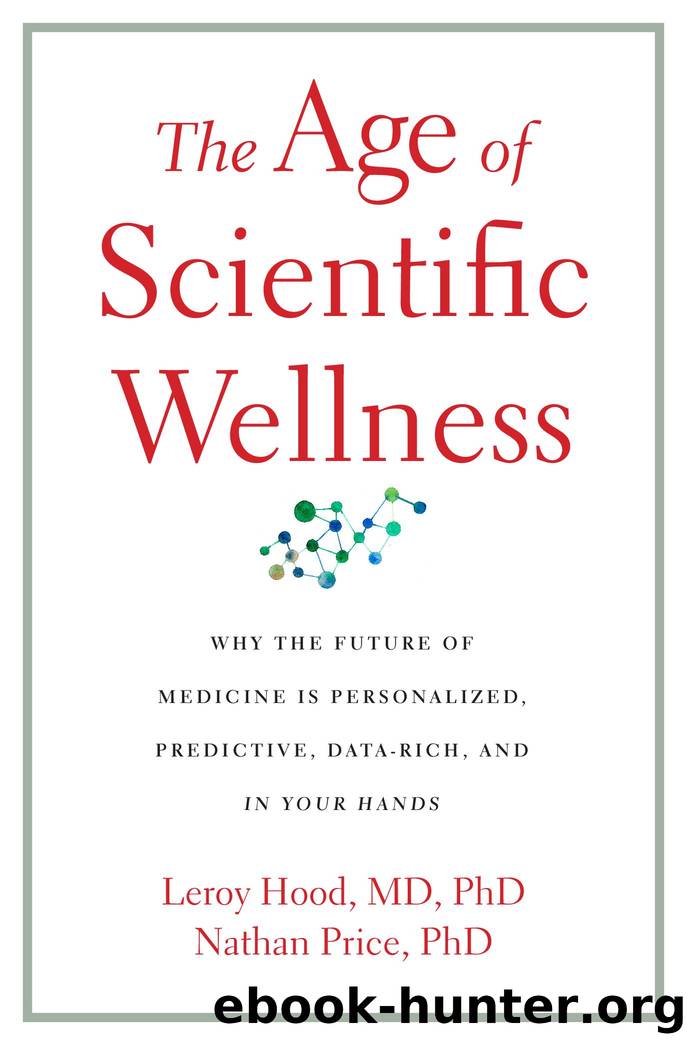The Age of Scientific Wellness by Leroy Hood

Author:Leroy Hood
Language: eng
Format: epub
Publisher: Harvard University Press
What Our Brains Need
Brain exercise, like physical exercise, is good for just about everyone at any point in life. In much the same way that we can now identify what kinds of exercise different individuals need based on their genome, phenome, and specific lifestyles, it is likely that weâll soon be able to identify the specific brain training regimens individuals need either to stay cognitively fit or to regain cognitive fitness when it has been lost. Slowly at first, and then quite rapidly in coming years, the combined power of individual data clouds and artificial intelligence will lead us to a world in which a combination of a cognitive assessment, whole-genome sequencing, analysis of a personâs blood analyte composition and gut microbiome, and various digital health measurements will produce an individualized road map for neurological (as well as physical) fitness.26 The gut-brain axis in particular is emerging as a fascinating regulator of brain health, where the microbial community in the gut can actually impact neurochemistry, cognition, and behavior.27 We will be learning how to harness this powerful tool in the coming years. Just as drivers have come to expect smartphone-based mapping apps to readjust when we make a wrong turn, real-time data analysis will readjust our brain training interventions based on day-to-day assessments of cognition.
We know that even the most basic tools can be used to address cognitive issues across a wide range of individuals for a wide array of conditions. First and foremost of these is nutrition. When researchers from the Netherlands assessed the diets and physiological brain health of nearly 4,500 people, they found a striking correlation: those who eat lots of vegetables, fruit, whole grains, nuts, and fish and avoid sugar-containing beverages had larger brains, more gray and white matter volume, and healthier hippocampi (a part of the brain that is involved in forming, storing, and processing memory).28 There are also nutrients that can significantly reduce cognitive decline in individuals suffering from concussions, some of which Thorne co-developed with Mayo Clinic neurologist David Dodick into a product called SynaQuell, which was validated for improving outcomes for concussed athletes against a control group in a Mayo Clinic-led clinical trial.29
âThereâs this kind of neglected component of food that is really the effect that our nutrition diets have on the way our brains work,â noted Dr. Lisa Mosconi, author of Brain Food: The Surprising Science of Eating for Cognitive Power in a 2017 interview. âFood is not just the source of nourishment and entertainment, but food is really chemistry.â30
One example that has found its way into the popular pressâfor good reasonâis omega-3 fatty acids. Omega-3s are incredibly important for brain development and continued brain function throughout life, and some forms are more highly concentrated in the brain than any other tissue in the body. Omega-3 deficiencies over long periods are associated with cognitive decline and mood disorders, including major depression. Omega-3s are found in many healthy food sources, including fatty fish (which actually get them from eating marine algae).
Another example
Download
This site does not store any files on its server. We only index and link to content provided by other sites. Please contact the content providers to delete copyright contents if any and email us, we'll remove relevant links or contents immediately.
| Fossils | Game Theory |
| Genetics | Molecular Biology |
| Organic | Paleontology |
Sapiens: A Brief History of Humankind by Yuval Noah Harari(14344)
Sapiens by Yuval Noah Harari(5344)
Pale Blue Dot by Carl Sagan(4981)
Homo Deus: A Brief History of Tomorrow by Yuval Noah Harari(4890)
Livewired by David Eagleman(3752)
Origin Story: A Big History of Everything by David Christian(3677)
Brief Answers to the Big Questions by Stephen Hawking(3408)
Inferior by Angela Saini(3300)
Origin Story by David Christian(3184)
Signature in the Cell: DNA and the Evidence for Intelligent Design by Stephen C. Meyer(3114)
The Gene: An Intimate History by Siddhartha Mukherjee(3085)
The Evolution of Beauty by Richard O. Prum(2972)
Aliens by Jim Al-Khalili(2814)
How The Mind Works by Steven Pinker(2801)
A Short History of Nearly Everything by Bryson Bill(2674)
Sex at Dawn: The Prehistoric Origins of Modern Sexuality by Ryan Christopher(2506)
From Bacteria to Bach and Back by Daniel C. Dennett(2468)
Endless Forms Most Beautiful by Sean B. Carroll(2461)
Who We Are and How We Got Here by David Reich(2423)
